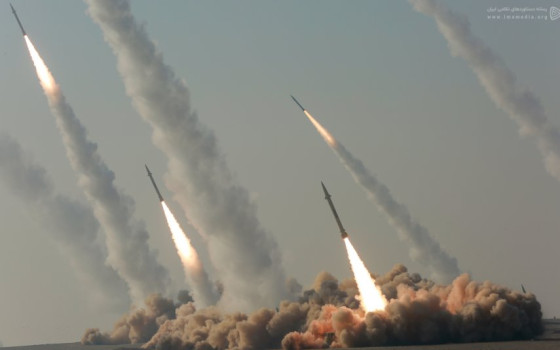
North Korea fires a missile, hours after warning of a "more aggressive" response

- Europe and Arabs
- Thursday , 17 November 2022 16:1 PM GMT
South Korea's military announced Thursday that North Korea had fired a short-range ballistic missile, the latest in an unprecedented wave of missile launches, as Pyongyang warned of a "harer" military response to the United States and its regional allies.
Washington seeks to enhance regional security cooperation and intensify joint military exercises in response to the increasing provocations by the nuclear-armed North Korea, which considers all steps of this kind as evidence of US aggression.
US President Joe Biden discussed the recent North Korean missile tests with his Chinese counterpart, Xi Jinping, earlier this week, and spoke to the leaders of Tokyo and Seoul, as concerns grow that the isolated regime could conduct its seventh nuclear test.
North Korean Foreign Minister Choe Son Hui said in a statement Thursday that Washington's moves to bolster its "extended deterrence" and conduct joint exercises with regional security allies were "foolish acts".
And she stressed that Washington's strengthening of security cooperation with Tokyo and Seoul will lead to "a more aggressive military response than the Democratic People's Republic of Korea."
The South Korean Army General Staff confirmed, "A short-range ballistic missile was detected at around 10:48 am (01:48 GMT) and was launched from Wonsan district in Gangwon Province."
The army stated that the missile flew over a distance of approximately 240 km, at an altitude of 47 km, and at a speed of Mach 4.
"South Korea and the United States are reaffirming their joint defense posture through the joint missile defense exercise that is taking place today," he added, referring to the scheduled military exercises.
Japan, for its part, confirmed that North Korea fired a missile, as the Prime Minister's Office indicated that Pyongyang's steps, "including the repeated launches of ballistic missiles, threaten the peace and security of our country and the regional and international communities."
Experts pointed out that Thursday's missile launch was timed to coincide with the North Korean Foreign Minister's statement. "It's an attempt to send a message to the United States and Japan," Xiong Seong-chang, a researcher at the Sejong Institute, told AFP.
- Stalemate at the UN -
North Korea conducted a series of missile launches earlier this month, including on November 2 when it fired 23 missiles, more than it fired in all of 2017 when its leader Kim Jong Un engaged in a spar with the then US president. Donald Trump.
The missile launch came as hundreds of US and South Korean warplanes, including B-1B heavy bombers, took part in the joint air exercises. This type of maneuver provokes strong reactions from the northern part, which sees it as training for an invasion.
Experts say that North Korea is taking advantage of the opportunity to conduct banned missile tests, because it is confident that it will be able to avoid additional UN sanctions, given the stalemate in the United Nations following the war in Ukraine.
China, Pyongyang's most important diplomatic and economic ally, joined Russia in May in vetoing efforts led by Washington in the UN Security Council to intensify sanctions against North Korea.
Pyongyang has also imposed a blockade on itself due to the Corona virus since the beginning of the year 2020, which experts indicate will limit the impact of any additional external sanctions.
Biden urged Chinese President Xi Jinping to use his influence to rein in North Korea when the two leaders met on the sidelines of the G20 summit on the Indonesian island of Bali.
Washington responded to North Korea's missile tests by extending exercises with the south and deploying a strategic bomber.
"The threatening statement of Choe Son Hui and the recent North Korean missile launch are just attempts to send a message that Pyongyang will not back down under international pressure," said Leif-Eric Easley, a professor at Ewha University in Seoul.
Biden also held talks with his South Korean counterpart Yoon Sok-yul and Japanese Prime Minister Fumio Kishida on Sunday to discuss ways to deal with North Korean threats.
It was clear, Easley said, that the three leaders had taken "concrete steps in the field of trilateral cooperation," even though Xi ended his Covid-related isolation with a "relatively diplomatic campaign" during the G20 summit.
"At some point, it will be in China's interest to put pressure on Pyongyang if it chooses to counter greater strategic unity between the United States, South Korea and Japan," Easley said.
Source: AFP












No Comments Found